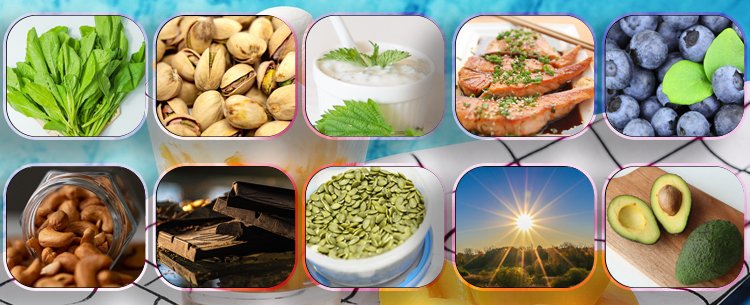10 Stress-Relieving Foods That Can Boost Your Mood & Reduce Anxiety
Feeling stressed? Discover 10 nutrient-rich foods that can help lower stress, boost mood, and improve overall well-being. Learn about the best and worst foods for stress relief.

Feeling Stressed? Instead of Reaching for Junk Food, Try These Stress-Relieving Foods
Stress can take a toll on your mental and physical health. Instead of turning to unhealthy snacks, consider adding these nutrient-rich foods to your diet for natural stress relief.
Best Foods for Stress Relief
1. Green Leafy Vegetables
Dark leafy greens like spinach are rich in folate, which helps your body produce mood-regulating neurotransmitters, including serotonin and dopamine. A 2012 study found that people who consumed the most folate had a lower risk of depression than those who ate the least.
2. Nuts
Nuts are a good source of tryptophan, an amino acid (protein building block) that your body converts into serotonin. Research shows that argumentative people who consumed tryptophan became markedly more pleasant. Other rich sources of tryptophan include pumpkin seeds, turkey breast, and free-range organic eggs.
3. Yogurt
Your gut health plays a crucial role in your mental well-being. Unhealthy gut flora can negatively impact brain health, leading to issues like anxiety and depression. Beneficial bacteria have a direct effect on brain chemistry, transmitting mood- and behavior-regulating signals to your brain via the vagus nerve.
Women who regularly ate yogurt containing beneficial bacteria showed improved brain function compared to those who did not consume probiotics. However, commercial yogurt is often unhealthy—loaded with artificial sweeteners, colors, flavorings, and sugar. Most importantly, the vast majority of commercial yogurts contain clinically insignificant levels of beneficial bacteria.
You would be far better off making your own yogurt from raw milk.
4. Fish
Omega-3 fatty acids found in salmon, sardines, and anchovies (or in supplement form, such as krill oil) play a role in your emotional well-being.
5. Blueberries
Anthocyanins, the pigments that give blueberries and blackberries their deep color, aid in the production of dopamine, a chemical essential for coordination, memory function, and mood regulation.
6. Pistachios
One study found that eating two servings of pistachios a day reduced vascular constriction during stress. This means less strain on the heart, as the arteries remain more dilated. Additionally, the repetitive act of shelling pistachios can be therapeutic, helping to calm racing thoughts.
7. Dark Chocolate
If you experience a mood boost when eating pure, unprocessed chocolate, there’s a scientific reason for it. Dark chocolate contains anandamide, a neurotransmitter that temporarily blocks pain and reduces feelings of depression.
Interestingly, the word “anandamide” is derived from the Sanskrit word for “bliss.” Chocolate not only produces this compound but also contains other chemicals that prolong its "feel-good" effects.
8. Seeds
Magnesium, which acts as a precursor for neurotransmitters like serotonin, plays a crucial role in regulating emotions and enhancing well-being. Excellent sources of magnesium include seaweed, green leafy vegetables (such as spinach), beans, nuts, and seeds like pumpkin, sunflower, and sesame seeds.
Avocados also contain magnesium. Juicing vegetables can be an effective way to ensure adequate intake.
9. Avocado
Avocados provide nearly 20 essential health-boosting nutrients, including potassium, vitamin E, B vitamins, and folate. Research published in the Nutrition Journal found that eating just half an avocado with lunch can promote satiety, which may help prevent unnecessary snacking, particularly for those who are overweight.
10. Sunshine
Although not technically a food, daily exposure to sunlight may help stabilize your mood. Serotonin, the brain hormone associated with mood elevation, rises with exposure to bright light and drops with decreased sun exposure. Low vitamin D levels have also been linked to an increased risk of panic disorders.
Worst Foods to Eat When Stressed
While some foods can help you manage stress, others can make it worse. Many people turn to high-carb comfort foods when stressed, but these choices may do more harm than good.
1. Sugar
Sugar consumption leads to fluctuations in blood sugar levels, triggering mood swings. Additionally, excess sugar (particularly fructose) and grains contribute to insulin and leptin resistance, impairing signaling pathways that are crucial for mental health.
Sugar also promotes chronic inflammation, which, over time, can disrupt immune function and increase the risk of depression.
2. Gluten
Gluten, a protein found in wheat, rye, and barley, may negatively impact mood and brain health. Studies suggest that wheat consumption could contribute to mood disturbances, including depression and, in some cases, more severe mental health conditions like schizophrenia.
3. Processed Foods
Processed foods often contain a mix of sugar, gluten, trans fats, artificial colors, monosodium glutamate (MSG), artificial sweeteners, and other synthetic ingredients—many of which have been linked to irritability and poor mood.
Final Thoughts
There is no single food that can eliminate stress completely, but incorporating more of these nutrient-rich foods into your diet—along with regular exercise—can help improve your overall well-being.
What's Your Reaction?






















